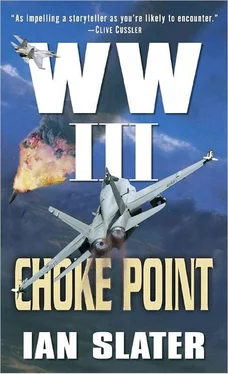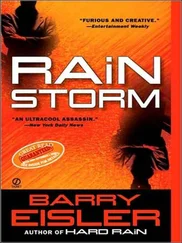That’s the general, thought Frank. Hasn’t seen you in ages, and right off the bat he’s telling you , the ship’s master — no, ordering you — what to do.
“You’re assuming Petrel ’s going to do a grid,” said Frank.
“Of course. Aren’t you?”
“Yes, I agree with you. Those people are still—”
“People?” Freeman cut in crossly, his body odor dominating the dry lab. “They aren’t people . They’re goddamn animals!”
As yet Hall hadn’t heard about what had happened to Dixon, who, he remembered, had aged overnight after his swim buddy’s death. Frank didn’t press the general for any details of what exactly had taken place. It wasn’t the time. Freeman left Frank to it and turned his attention back to the five bodies laid out on the stern, pulling back the blanket from each one, squatting down, staring at them.
“I think he’s enjoying it,” Malcolm commented to the bosun, who was looking down at Petrel ’s barely visible wake as it proceeded slowly into the general area of the problematic slab. Sal and Choir, also on the stern deck, were wondering aloud what had happened to the missing floater, still lost in the fog.
“I think that floater was a swimmer,” cut in Aussie. “Faked us out. Big bloody drama, clutching his chest and falling from that RIB. Bastard’s probably ashore by now, draggin’ ’imself up that S trail.”
“Possible,” said Freeman, but the general, as Sal, Choir, and an equally perplexed Malcolm looked on, was still looking at the five whose floating days were over. Aussie, meanwhile, carefully went through the dead men’s sodden camouflage-pattern uniforms for any ID.
“Definitely not all Chinese,” said Choir, glancing over at Aussie from the portside rail. “You’ve lost your bet, boyo.”
“The hell I have. They all look Chinese to me.”
“Guy looks like he tried to hang himself,” said Sal, leaning over and pointing to a dark bruise ringing one of the dead men’s throats.
“Should have,” said Aussie as Sal let the blood-soaked blanket fall back over the corpse’s face. “Would’ve saved us the trouble.”
“Yeah,” agreed Sal, standing up, arching and massaging his back, yawning.
Malcolm couldn’t tell whether it was the way Salvini arched his back that angered him or the SpecFor warrior’s yawn, the soldier’s manner appearing to him and Jimmy as inappropriately cavalier, downright disrespectful in the presence of the dead. Freeman was now pulling the fog-shrouded blanket back from the man Sal had referred to.
“I know they’re terrorists,” Malcolm told Jimmy, “but Jesus — know what I mean?”
“Yeah,” Jimmy said, lowering his voice and looking across the deck toward Freeman. “He’s supposed to be a legend. Tiny says his troops used to call him ’George C. Scott.’ “
Malcolm looked blank.
“You know — General Patton.”
“Oh. Yeah?”
“Scuttlebutt is that he’s been sidelined ever since Clinton. Apparently criticized Bill in ’ninety-eight. Told him the White House didn’t know dick about handling a terrorist situation. Said they were wasting their time, firing a cruise instead of sending in helo snatch-and-grab squads — take some of the towel heads up an’ tell ’em, ’Talk or you’ll be the first A-rabs to walk in space.’ “
“So Clinton canned him?” asked Malcolm.
“No, the Pentagon did. Said Freeman was a loose cannon. Now they’re beatin’ the crap out of towel heads.”
“So how come Freeman’s still sidelined?” pressed Malcolm.
Jimmy shrugged. “Pentagon’s like anywhere else, I guess. Once you’re out, you—” Jimmy stopped as Freeman made his way to the stern’s A-frame and, standing by them, stared thoughtfully into the fog, as if willing his tired, deep blue eyes to see farther.
“Where’d you say the Skate was?” Malcolm asked Jimmy, in case the general suspected they’d been talking about him.
The general remained staring intently astern. He turned, looked directly at the two men, frowned darkly, then resumed staring out into the fog.
The two men moved away toward the dry lab. “He must have heard us,” said Malcolm softly.
Jimmy, turning for a last look at Freeman, almost tripped on the dry lab’s doorsill. “No,” he told Malcolm, “I don’t think he heard us.”
“C’mon, Jimmy. Did you see that frown?”
“It wasn’t meant for us,” replied Jimmy. “Something’s bothering him.”
Jimmy was right. Something was bothering Freeman, something he’d seen but couldn’t identify. Whatever it was, it was like a wasp hovering about, worrying you, when all you wanted to do was rest.
Right now, however, his first priority was to secure sleeping space for Sal, Aussie, and Choir and order them to rest, as if the three veterans of a dozen foreign wars needed a command to sleep after their grueling hours afloat and ashore. And the general’s second priority was to get rest himself. Besides, the last thing he wanted was to discuss with Hall or anyone else his failure to stop the sub in the crescent bay.
His team’s failure, everyone’s failure so far, stalked his sleep as he lay on a mattress brought to the dry lab, his snoring so loud that one of the side-scan technicians put on a pair of cranials.
“Goddamn,” the technician muttered, “I can still hear him.”
As a sailor, one of whose qualifications is the ability to live 24/7 with constant close-quarter noise, the tech’s complaint about Freeman’s train-whistle breathing was evidence, Frank thought, of the extraordinary tension aboard the Petrel .
In Washington, D.C., public opinion was overwhelmingly in favor of taking out Penghu. Both the Joint Chiefs and the Taiwanese government pointed out the extraordinary danger of allowing China to have a massive air base only fifteen miles from the island nation — two and a half minutes away by fighter-bomber. And, as many other American leaders and newspapers pointed out, most noticeably the New York Times , “If Taiwan, the only other democratic bulwark in Asia besides Japan, were to be lost, American power and influence, as well as its strategic and economic interests, would suffer irreparable harm.”
And the French were gloating, Le Monde commenting in an editorial that “once again Washington has to recognize that in its war against terrorism, in a conflict of such elasticity, its conventional force is passé and its navy has become what the Chinese call a ’paper tiger.’ “
The President said he didn’t give a damn what the foreign press said, especially France and Germany. The American people, however, did give a damn, and together with the Penghu military danger being pressed home with increasing fervor by the Pentagon, State, and Taipei, the President sought and received Congressional approval to “neutralize” the Penghu threat.
And so as Petrel approached the halfway mark of its search grid, the President ordered all battle groups to stand by, “pending imminent action against Penghu — collateral damage notwithstanding.” Which meant that whoever was to be tasked with the action would not allow the presence of Taiwanese hostages to impede the mission.
Admiral Jensen and Admiral Crowley had something in common. Jensen had been plunged further into depression over the promise of the NR-1B failing to materialize to rescue his all but fatally wounded reputation. Crowley, on the McCain , watching CNN’s report on the mounting public pressure, dared to hope that he might now have the chance to redeem his reputation as a superior decision maker, following what had already become known among those who’d survived the kamikaze attack on their beloved boat as “Crowley’s clanger.”
Читать дальше












